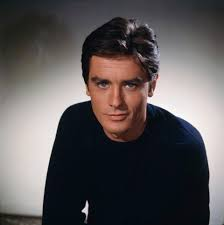Alain Delon
Alain Delon, born on November 8, 1935, in Sceaux, France, is one of the most iconic figures in French cinema. Known for his striking looks and enigmatic screen presence, Delon’s career spans over six decades, during which he has established himself as a quintessential leading man in European cinema. Beyond acting, Delon has also made his mark as a producer, businessman, and cultural icon.
Table of Contents
Early Life and Beginnings
Alain Delon’s early life was far from the glamorous world of film. His parents divorced when he was young, and Delon’s childhood was marked by instability as he moved between foster homes and boarding schools. His rebellious nature led to a brief stint in the French Navy, where he served in the First Indochina War. Upon returning to France, Delon found himself at a crossroads, unsure of what path to take.
It was during this uncertain period that Delon stumbled into acting. His striking looks and natural charisma caught the attention of film directors, leading to his first roles in the late 1950s. Though initially inexperienced, Delon’s raw talent was undeniable, and it wasn’t long before he started receiving more substantial roles.

Rise to Stardom
Delon’s big break came in 1960 with the release of Purple Noon (Plein Soleil), a film adaptation of Patricia Highsmith’s novel The Talented Mr. Ripley. Delon played the role of Tom Ripley, a charming yet morally ambiguous character, with such finesse that the performance catapulted him to international fame. His portrayal of Ripley remains one of the most celebrated in his career.
Following the success of Purple Noon, Delon starred in a series of films that cemented his status as a leading man. In 1963, he appeared in Luchino Visconti’s The Leopard (Il Gattopardo), alongside Burt Lancaster and Claudia Cardinale. The film, set in 19th-century Sicily, is a masterpiece of Italian cinema, and Delon’s role as the dashing Tancredi solidified his image as a European heartthrob.

Delon’s Collaborations with Renowned Directors
Throughout his career, Alain Delon worked with some of the most prestigious directors in the film industry, both in France and internationally. One of his most notable collaborations was with Jean-Pierre Melville, a French filmmaker known for his contributions to the film noir genre. Delon starred in several of Melville’s films, including Le Samouraï (1967), where he played a stoic hitman, Jef Costello. The film is often regarded as a masterpiece, with Delon’s minimalist and disciplined performance becoming iconic.
Another significant collaboration was with the Italian director Michelangelo Antonioni in L’Eclisse (1962), where Delon starred opposite Monica Vitti. The film, a contemplative exploration of alienation and disconnection in modern society, showcased Delon’s ability to convey complex emotions with subtlety and depth.

Delon as a Producer and Entrepreneur
In addition to his acting career, Alain Delon ventured into film production. He founded his production company, Adel Productions, in the 1960s, which allowed him to have more creative control over his projects. One of the first films produced by Adel Productions was The Girl on a Motorcycle (1968), starring Marianne Faithfull. Delon also produced several films in which he starred, such as The Sicilian Clan (1969) and Borsalino (1970).
Delon’s business acumen extended beyond the film industry. He launched a line of luxury products, including perfumes, eyewear, and accessories, capitalizing on his status as a style icon. His brand, often associated with sophistication and elegance, further cemented his status as a cultural figure.
Personal Life and Public Image
Alain Delon’s personal life has been as intriguing as his film career. He has been linked to several high-profile romances, including relationships with actresses Romy Schneider and Nathalie Delon, the latter of whom he married in 1964. The couple had a son, Anthony Delon, who also pursued a career in acting. Delon has two other children, Anouchka and Alain-Fabien, from subsequent relationships.
Delon’s image as a brooding, solitary figure has been both a blessing and a curse. While it has contributed to his mystique, it has also led to controversies and a sometimes contentious relationship with the media. Delon has never shied away from expressing his opinions, often making headlines for his candid remarks on various topics, including politics and society.
Awards and Recognition
Over the course of his career, Alain Delon has received numerous accolades, reflecting his contributions to cinema. In 1985, he won the César Award for Best Actor for his role in Notre Histoire (1984). He was also honored with a Lifetime Achievement Award at the Berlin International Film Festival in 1995. In 2019, Delon received an honorary Palme d’Or at the Cannes Film Festival, a recognition of his enduring impact on the film industry.
Despite the accolades, Delon has remained somewhat of an outsider in the French film industry, often preferring to work on his terms. This independence has allowed him to maintain a unique and lasting legacy.
Legacy and Influence
Alain Delon’s influence on cinema is undeniable. His performances have inspired generations of actors and filmmakers, and his distinctive style has left a lasting imprint on the industry. Delon’s portrayal of complex, often morally ambiguous characters has become a benchmark for actors seeking to explore the darker facets of human nature.
indianfastearning.comhttp://indianfastearning.com
Conclusion
Alain Delon’s journey from a troubled youth to an international film icon is a story of resilience, talent, and determination. With a career spanning over sixty years, Delon has left an indelible mark on the world of cinema. His performances, particularly in films like Le Samouraï and The Leopard, remain timeless, and his influence continues to be felt in the industry. As a producer, entrepreneur, and actor, Delon has built a legacy that transcends the screen, making him one of the most enduring figures in the history of film.
www.utube.comhttp://www.utube.com







